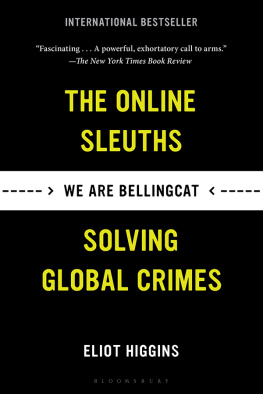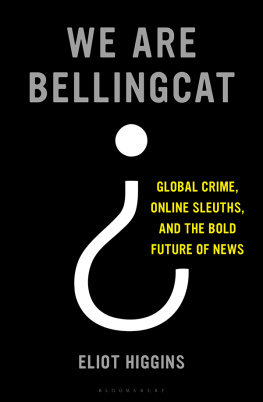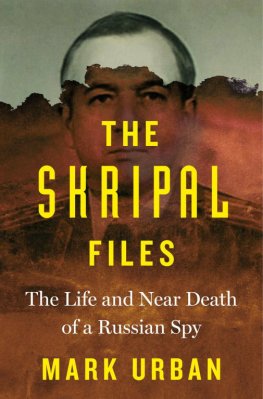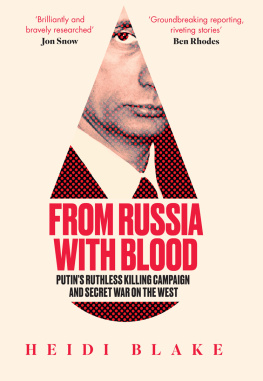
Praise for We Are Bellingcat
A David-and-Goliath story for the digital age Like Bellingcats work, this book is both straight to the point and thrilling. It is a balm for the soul of anyone who has grown weary of the chaos wrought by social media and a timely reminder thatin the right handsthe internet can still be an awesome force for good. Foreign Policy
Fascinating Chronicling the dark arts of dogged internet investigation, this book is a powerful, exhortatory call to arms for citizen journalists fighting for truth in a world where authenticity has become the most elusive of commodities. The New York Times Book Review
Recent [open-source] journalism achievementssuch as Bellingcats investigations are compelling not just for their findings, but for the openness with which they explain the process of discovery. This is the closest that journalism has come to a scientific method. The New York Review of Books
Uplifting Riveting What will fire people through these pages, gripped, is the focused, and extraordinary, investigations that Bellingcat runs Each runs as if the concluding chapter of a Holmesian whodunnit. The Telegraph
Fascinating The lesson of this deeply impressive book is that, despite the noise, the propaganda, and the lies, the truth is everywhere. You just have to know how to look for it. The Spectator
We Are Bellingcat is Higginss gripping account of how he reinvented reporting for the internet age Bellingcats rise reveals something new about our digitally mediated times: spying is no longer the preserve of nation statesanyone with an internet connection can do it. Luke Harding, The Observer
John le Carr demystified the intelligence services; Higgins has demystified intelligence gathering itself. Financial Times
Jaw-dropping We Are Bellingcat reveals the power within each one of us to pierce the walls of disinformation and learn the truth about whats happening out there. New York Journal of Books
Higgins traces his improbable journey from college dropout and video game player to open-source intelligence pioneer He recounts this unlikely tale with fascinating detail and fervor, making We Are Bellingcat a mix of memoir, manifesto, and police procedural: CSI for the international relations set. Foreign Affairs
If you dont know what Bellingcat is, this is your chance to learn: We Are Bellingcat tells the story of the most innovative practitioners of open-source intelligence and online journalism in the world. In this book their founder, Eliot Higgins, describes how and why they do it. Anne Applebaum, author of Twilight of Democracy and Gulag
Offers some hope that ordinary people, as well as the media, can judge events based on documented facts, not just wild assertions. The Tyee
Higginss self-taught skills are impressive Fans of Bellingcat and advocates of citizen journalism will be fascinated by the behind-the-scenes details. Publishers Weekly
We Are Bellingcat tells the gripping story of how the Bellingcat team used innovative investigation techniques to expose some of the gravest state crimes of our era. Their success is a wake-up call to governments who have been asleep at the wheel about what is needed to fight dictators and kleptocrats. Bill Browder, author of Red Notice
Lively A provocative, even inspirational read. Kirkus Reviews
The tools and techniques Bellingcat uses are being shared and taught to groups around the world in hopes of capturing records of human rights abuses and war crimes, but also to ensure that a true accounting of the facts is preserved. In this post-truth era, such accounting is more critical than ever. Diplomatic Courier
If there were a Nobel Prize in uncovering war crimes, Bellingcat would receive it. No wonder authoritarian and criminal regimes hate them so. Toomas Hendrik Ilves, former president of Estonia

BLOOMSBURY PUBLISHING
Bloomsbury Publishing Inc.
1385 Broadway, New York, NY 10018, USA
BLOOMSBURY, BLOOMSBURY PUBLISHING and the Diana logo are trademarks of Bloomsbury Publishing Plc
First published in 2021 in Great Britain
First published in the United States 2021
This edition published 2022
Copyright Eliot Higgins, 2021
All rights reserved. No part of this publication may be reproduced or transmitted in any form or by any means, electronic or mechanical, including photocopying, recording, or any information storage or retrieval system, without prior permission in writing from the publishers.
Bloomsbury Publishing Plc does not have any control over, or responsibility for, any third-party websites referred to or in this book. All internet addresses given in this book were correct at the time of going to press. The author and publisher regret any inconvenience caused if addresses have changed or sites have ceased to exist, but can accept no responsibility for any such changes.
ISBN: HB: 978-1-63557-730-3; PB: 978-1-63557-847-8; eBook: 978-1-63557-731-0
Library of Congress Control Number: 2020950711
Typeset by Newgen KnowledgeWorks Pvt. Ltd., Chennai, India
To find out more about our authors and books visit www.bloomsbury.com and sign up for our newsletters
Bloomsbury books may be purchased for business or promotional use. For information on bulk purchases please contact Macmillan Corporate and Premium Sales Department at .
Contents
Government ministers hurried into an underground conference room in central London for the COBRA crisis-response meeting. A chemical weapons attack had taken place on British soil; it looked like an assassination attempt. The Skripals remained on ventilators in a hospital, pumped full of atropine, under sedation and under armed guard. Britain needed to respond. Suspicions turned to the Kremlin one victim had been a former colonel in Russian military intelligence who had worked as a double agent for the British. On 4 March 2018, he and his daughter were found slumped on a bench in the peaceful English city of Salisbury, both on the verge of death. Moscow denied responsibility.
Our colleagues say with pathos, with serious faces that, if this was done by Russia, then the response will be such that Russia will remember it forever, said Foreign Minister
Yet the Kremlin had been implicated in revenge poisonings before, notably in the case of Alexander Litvinenko, another former Russian intelligence officer who had defected to Britain and become a scathing critic of President Vladimir Putin. On 1 November 2006, Litvinenko met two former KGB agents at the Millennium Hotel in London. Later that night, he fell ill. Within weeks, he was dead of exposure to polonium-210.
By coincidence, the British defence lab that studies such poisons, Porton Down, happens to be a few miles outside Salisbury. Chemical-weapons experts there were urgently studying blood samples from the sixty-six-year-old Sergei Skripal and his thirty-three-year-old daughter, Yulia, trying to figure out what afflicted them. The results came back: Novichok A234, a nerve agent that the Soviet Union had developed in the 1970s and 1980s, back when Vladimir Putin was just an officer in the KGB. A smear on the skin could cause loss of vision, constricted breathing, incessant vomiting, convulsions, death. Intelligence analysts discovered that Russia had been intercepting communications between Skripal and his daughter before she flew from Moscow for a two-week holiday. Tracking Yulia, Russian operatives would have found her father.
Next page







